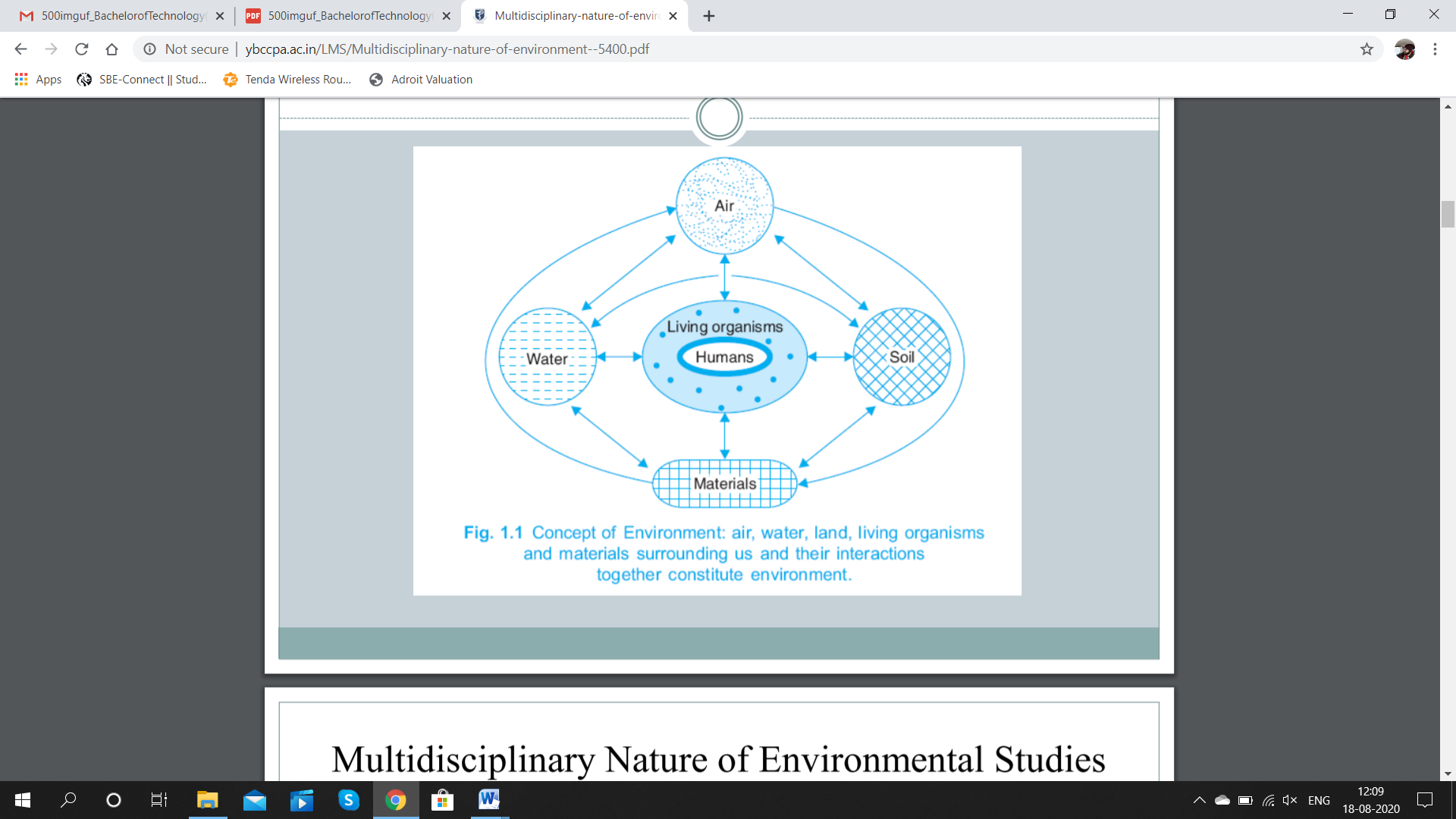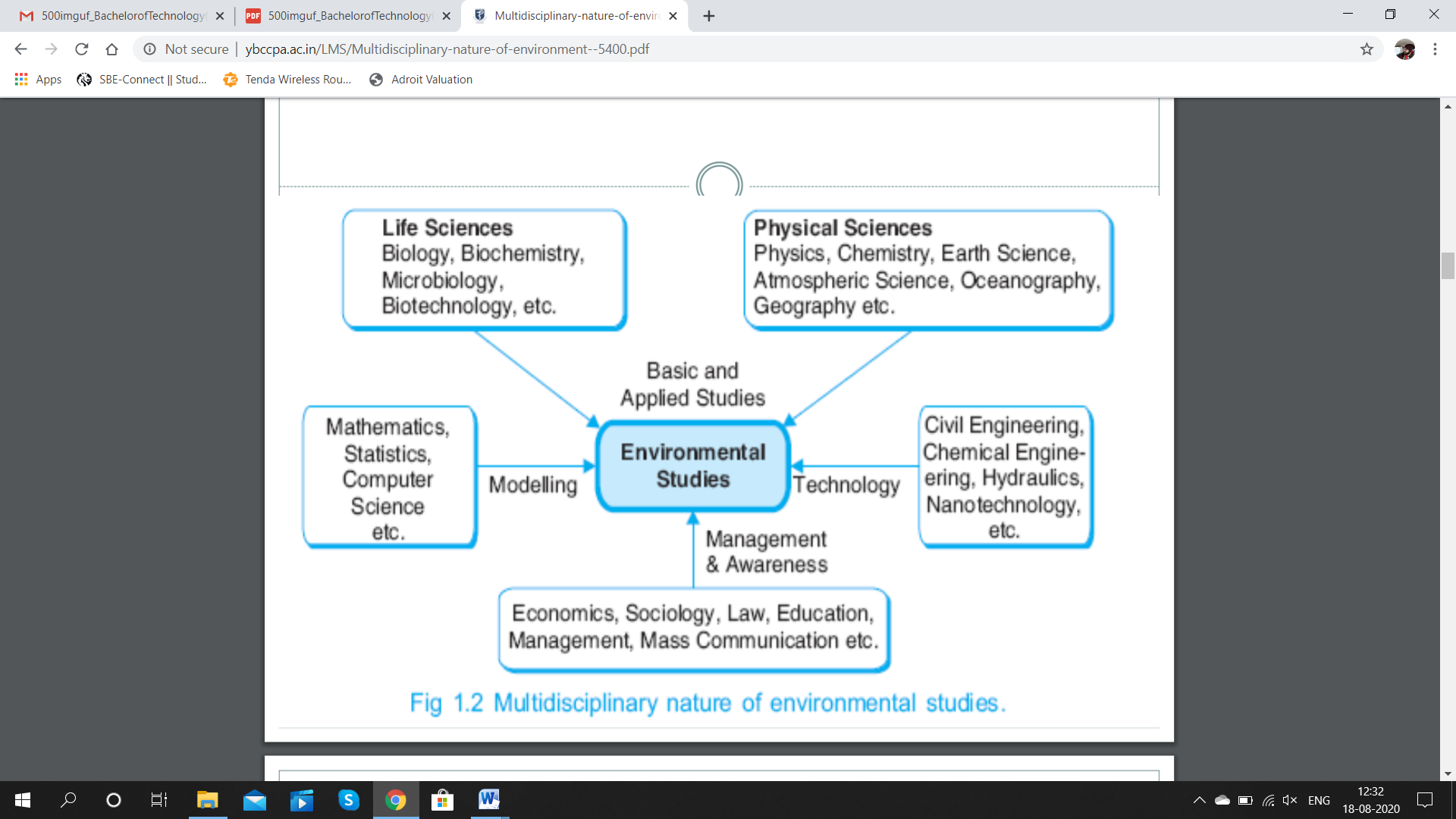Unit 1
Introduction to Environmental Studies
Environment as a word covers the sum of extrinsic forces, factors and suitable conditions, which are essential for the origination and survival of all life forms.
‘Environment’ is composed of every external factor that has influenced all living organisms since birth.
Environment is the aggregate of physical, chemical, biological and social components on Earth which are capable of causing direct or indirect effects on the survival of living and non-living things and their interactions.

Fig1.1 Interaction of Air, Water, Land (Soil), Resources (Materials) with Living Organisms constitutes Environment.
Study of environment & its components is a multidisciplinary field as it consists of Science, Arts, Commerce, Mathematics and other specialized fields such as Geography, Topography, Anthropology, etc.
Environmental studies provide us a platform for the thorough study of living organism and its surroundings.

Fig 1.2 Depiction of Multidisciplinary Nature of Environmental Studies & its Components
- Environmental Studies as Applied Life Science: Life sciences including botany, zoology, microbiology, genetics, biochemistry, biotechnology, etc. help us in understanding the biotic components of environment and their interactions with each other and with abiotic components.
- Environmental Studies as Basic Physical Sciences: Core branches of physical sciences such as Chemistry, Physics, Geography, etc. give us an overview of chemical & physical structure of biotic components. Flow of energy transfer from one form to another also comes under this domain.
- Environmental Studies as Modelling Tool: It includes Mathematical Interpretations, Statistical Data Analysis, Computer Aided Analysis of Environment & its components.
- Environmental Studies as Technology: Branches of Civil Engineering, Chemical Engineering, Environmental Engineering, etc. have to deal with sustainable technological development without harming the environment in the form of Pollution Control, Waste Treatment and Reduction in overexploitation of natural resources.
- Environmental Studies as Management & Awareness: It covers all the rules regulations, laws and acts made in order to protect the environment and to create equilibrium between all life forms to sustain life and growth on earth.
Like its multidisciplinary nature, scope of Environmental Studies is also wide as follows:
1. The study makes mindfulness among the individuals to think about different sustainable and non-renewable assets of the surroundings.
2. It gives the information about natural frameworks and circumstances related to human survival.
3. It gives fundamental idea about biodiversity and risks related to it.
4. The examination empowers one to create a cause & effect relationship of consequences caused by human activities of our natural surroundings.
5. It empowers one to choose most suitable alternative from available pool in order to reduce overuse of natural resources.
6. The awareness of Environmental Studies empowers ecologically educated residents by letting them know about the natural demonstrations, rights, rules, regulations, enactments, amendments in the existing environmental acts and so on to settle on proper decisions and choices for the insurance and improvement of the earth and its inhabitants.
7. The study reveals the social issues like over population, health, cleanliness and sanitation. It gives remedial measures to these issues in the most suitable manner.
8. The investigation attempts to recognize and create the eco-friendly skills and non-conventional technologies that would not create any hindrance in the pathway of development without putting an extra burden on environment.
9. It shows us the requirement for supportable usage of resources as these assets are acquired from our predecessors. Hence it is our responsibility to pass these on to our forthcoming generations without decaying their overall quality.
10. The scope of Environmental Studies is incomplete without its impact on employment opportunities in the form of Environmental-Journalism, Research & Development, Environmental Management, etc.
1) Environmental studies help us to maintain ecological balance and equilibrium in the environment by providing a basic platform for interaction of environmental system and inter-related processes.
2) It gives information regarding the changes that takes place due to various factors and helps in gathering skills to analyse various environmental processes and the effect of human activities on them.
3) Environmental studies help to achieve sustainable development in order to achieve a state of optimum utilisation of resources without affecting the needs of future generations. It ultimately makes us understand the relationship between development and the environment.
4) This field helps to educate people regarding their responsibilities and lawful duties towards the protection of environment.
5) Environmental study help us to analyse the impact of human activities on various processes occurring in water, air and land which leads to contamination and results in environmental pollution
6) It also deals with the most important issues like safe and clean potable water, health-hygiene and cleanliness of surroundings
7) The discipline provides knowledge of the environment and various environmental issues. It examines the scientific base for environmental, cultural and social concerns about our present energy needs, global climate changes, toxic emission and waste disposal.
8) Development and optimum utilisation of energy resources is an important aspect of environmental studies.
9) Environmental acts, rules, regulations, law, amendments and fields like business administration, environmental engineering are emerging as new career opportunities under its domain.
10) To analyse the complex nature of vast bio-diversity on our planet, we need scientific approach of Environmental - Studies.
- Sustainability:
The ability to sustain for a prolonged period of time is called sustainability. We can achieve sustainability by meeting our present needs without making any compromise for the survival of our future generations.
- Sustainable Development:
It is an economic and social development that does not depletes natural resources.
Growth & Development are the everlasting needs of survival. But such development should not cost us burden in the form of depletion of nature. Hence, The Brundtland Report, published in 1987 by the United Nations World Commission on Environment and Development, coined the term "sustainable development" and defined it as "development that meets the needs of the present without compromising the ability of future generations to meet their own needs."
The Sustainable Development Goals, also called as the Global Goals, were adopted by United Nations Member States in the year 2015 to end poverty, protect the planet and ensure that all people enjoy peace and prosperity by the end of year 2030. SDG’s are as follows:
- No Poverty
- No Hunger
- Good Health & Well Being
- Quality Education
- Gender Equality
- Clean Water & Sanitisation
- Affordable & Clean Energy
- Decent Work & Economic Growth
- Industry Innovation & Infrastructure
- Reduced Inequalities
- Sustainable Cities & Communities
- Responsible Consumption & Production
- Climate Action
- Life Below Water
- Life on Land
- Peace, Justice & Strong Institutions
- Partnerships for the Goals